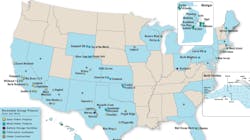Duke Looks to Sell Commercial Renewables Group
Duke Energy Corp. executives said Thursday they will look to sell the utility’s commercial renewables portfolio as they prepare to ramp up investment in Duke’s regulated businesses.
Launched in 2007, the commercial renewables group now accounts for about 5% of Charlotte-based Duke’s earnings and is among the country’s top 10 such ventures. A sale of the portfolio, which comprises more than 5,100MW of gross capacity across the country, would be one of the largest transactions to date of a group of renewable energy projects and would help Duke lighten its debt load. Wind comprises 66% of that net generating capacity, with solar accounting for 33% and battery projects in Texas making up the small remainder.
“Our strategic review will be thorough yet timely,” Chair, President and CEO Lynn Good said on a conference call with analysts and investors, adding that the process should conclude by year’s end. “Our regulated businesses are strongly positioned to grow within our earnings guidance range of 5% to 7%, providing consistent earnings and cash flow and supporting our attractive dividend.”
Duke’s decision to bring its commercial renewables, which have a book value of about $4 billion, to the market adds to similar moves by a number of its peers. Those include Eversource Energy and Consolidated Edison, which bills itself as the second-largest owner of solar electric projects in North America. Good said she expects strong interest from potential buyers in part because Duke has more than 1GW of projects in the works “that could be quite valuable in 2024, 2025.”
“I believe there will be a robust market for these assets, given that it's not only operating assets, but also a development pipeline, a platform, a team of very capable developers and operators that I think have the potential to add a great deal of value,” Good said on the conference call.
In the first six months of this year, the commercial renewables business produced a $63 million operating loss on revenues of $242 million. Adjusted for special items and noncontrolling interest, the group had earnings of $57 million, down from $74 million in the first six months of 2021.
Good and her team announced the renewables review along with Duke’s second-quarter results, which were headlined by net income of $880 million (versus $698 million in the prior-year period) on total operating revenues of nearly $6.7 billion. Operating income rose 21% to more than $1.4 billion, helped by total retail sales rising 1.5% on a weather-normalized basis.
Both industrial and commercial customers increased their electric volumes by 1.7% during the quarter and the total number of residential electric customers was up 1.8% year over year. Those numbers have led Good and CFO Steve Young to lift their full-year load growth forecast to a range of 1.5% to 2% from their previous 1.5% even though they expect growth to slow a little in the second half of the year.
Shares of Duke (Ticker: DUK) were down about 1% in afternoon trading Aug. 5. Over the past six months, they have risen slightly, growing the company’s market capitalization to more than $83 billion.
About the Author
Geert De Lombaerde
Senior Editor
A native of Belgium, Geert De Lombaerde has more than two decades of business journalism experience and writes about markets and economic trends for Endeavor Business Media publications T&D World, Healthcare Innovation, IndustryWeek, FleetOwner and Oil & Gas Journal. With a degree in journalism from the University of Missouri, he began his reporting career at the Business Courier in Cincinnati and later was managing editor and editor of the Nashville Business Journal. Most recently, he oversaw the online and print products of the Nashville Post and reported primarily on Middle Tennessee’s finance sector as well as many of its publicly traded companies.
